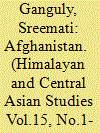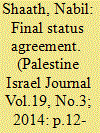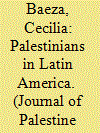|
|
|
Sort Order |
|
|
|
Items / Page
|
|
|
|
|
|
|
| Srl | Item |
| 1 |
ID:
128388


|
|
|
|
|
| Publication |
2011.
|
| Summary/Abstract |
In the context of conventional notion of Afghanistan's foreign policy strategy, two countries are accorded the most prominent status- the U.S. and Pakistan. Russia, on the other hand, shares a unique relationship with Afghanistan. The role of the buffer state, as played out by Afghanistan, during the 19"' century, halted Russian adventure towards ' South Asia, and Russian invasion of Afghanistan proved to be so much of a miscalculated affair as the misadventure led to the collapse of the Soviet Union itself. But even now, Russia has a great stake in Afghanistan's stability and is still considered to be a stabilizing factor in Afghanistan's security scenario. This paper analyzes the different phases of Russian involvement in Afghanistan in t international strategic environment.
|
|
|
|
|
|
|
|
|
|
|
|
|
|
|
|
| 2 |
ID:
129796


|
|
|
|
|
| Publication |
2014.
|
| Summary/Abstract |
The signing of the Oslo Accords created a tremendous sense of optimism. The Declaration of Principles signed between the Palestine Liberation Organization (PLO) and the Israeli government in 1993 led to many countries establishing diplomatic relations with Israel, a rise in Israel's GNP, and two productive economic conferences in Morocco and Jordan. One of the memories that best symbolizes this period for me occurred in May 1994: I had been invited to Washington by the president of the United States, and on the plane ride there, the whole cabin approached me with their menus asking me to autograph them. People were really excited, telling me: "This is peace! It's good for both parties." I felt their euphoria. It was a win-win game.
You cannot sign a peace treaty in a win-lose game, while devastating the other party. One only needs to look at what happened to the United States in Afghanistan and Iraq as examples. You don't really achieve a long-term solution with devastating wars. The only way you can build real peace is if it's a win-win situation: through negotiations, conversations and dialogues that lead to agreements which equally - or at least satisfactorily - satisfy both people. When it comes to our situation, I think it's not normal to talk now about permanence in these negotiations. Why? Because the interim agreement has continued for over 20 years. It is now 20 years since we signed the Declaration of Principles and the Oslo Agreement in the White House. So we have lived for 20 years in "interimness," and we have become accustomed to it. But "interimness" is not good for the Palestinians: While we've been in this seemingly never-ending interim time period, the Israeli government has been unilaterally changing the parameters, the terms of reference and the reality on the ground, thereby undermining the basis for a permanent solution.
|
|
|
|
|
|
|
|
|
|
|
|
|
|
|
|
| 3 |
ID:
130413


|
|
|
|
|
| Publication |
2014.
|
| Summary/Abstract |
Latin America is host to an estimated half-million people of Palestinian descent, the largest such population outside the Arab world. Migration to the region began in the late 1800s and peaked between 1900 and 1930, with surges around periods of war or economic crisis in Palestine. Predominantly the descendants of a pre-Nakba generation, mostly middle to upper-class Christians who are well-represented among political and business elites, Palestinians in Latin America do not easily fit into a national narrative shaped by the refugee experience. They have therefore held little interest for Palestinian historiography as they did not meet the criteria of "Palestinian-ness" as defined by a nationalist discourse centered on dispossession, denial, and statelessness. With a special focus on Chile,1 this article presents a historical overview of the Palestinian émigré community in Latin America, shedding light on its diverse and dynamic identity politics.
|
|
|
|
|
|
|
|
|
|
|
|
|
|
|
|
|
|
|
|
|